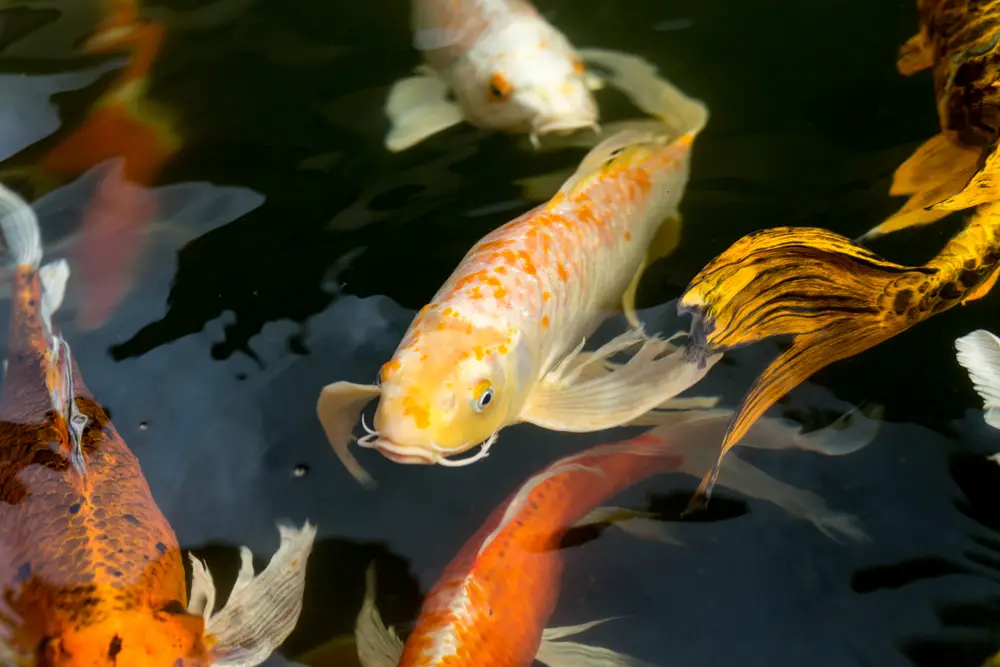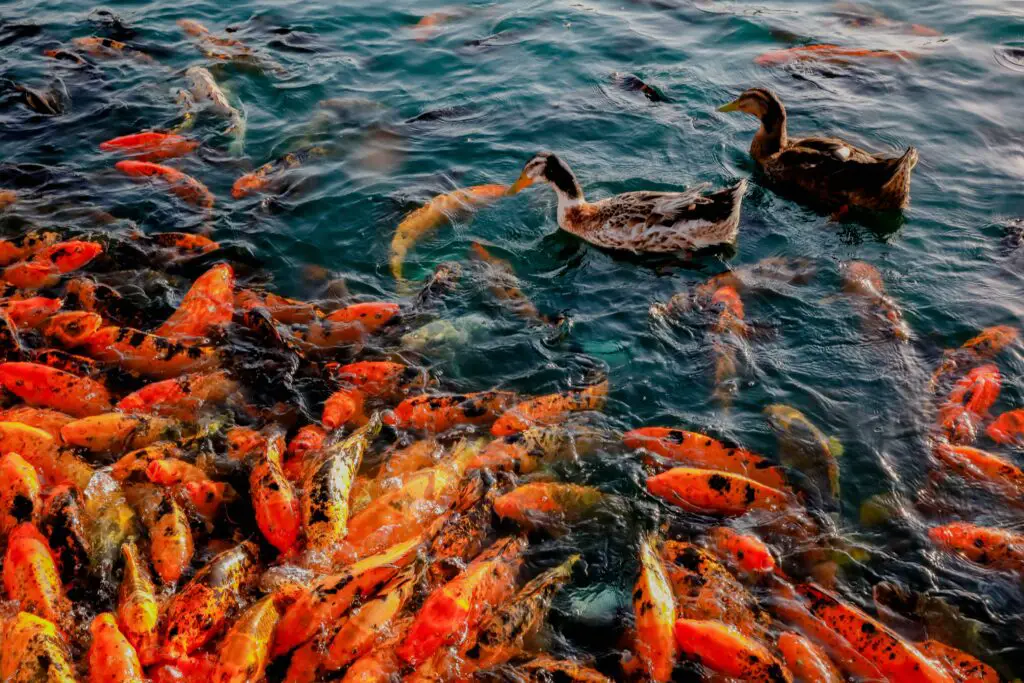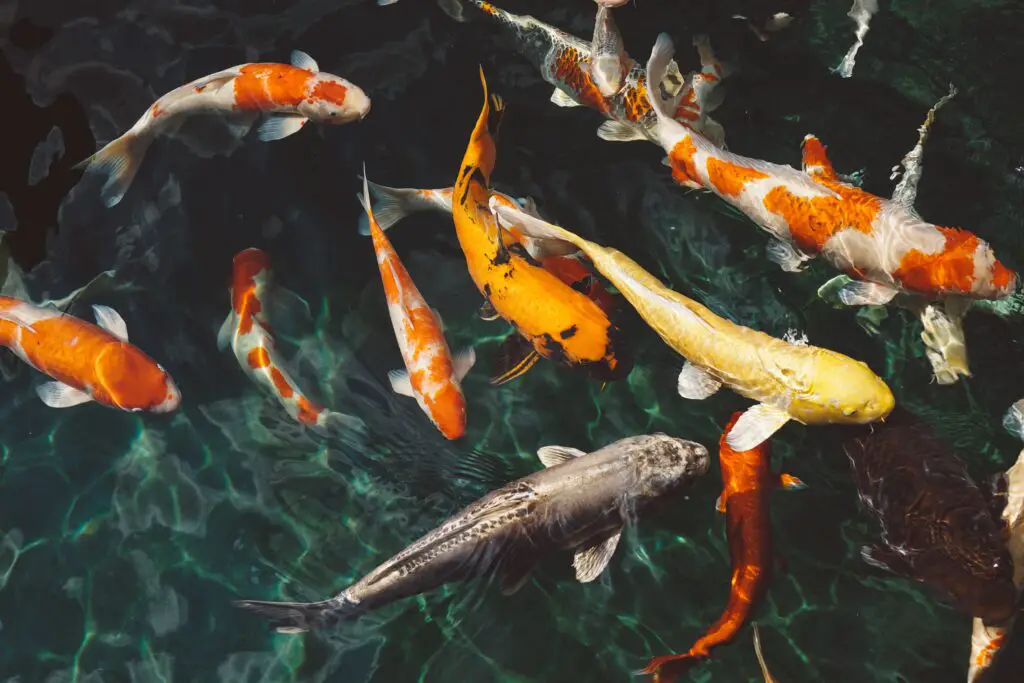Koi fish are among the most popular ornamental fish breeds on the planet. These species of fish are known for their mesmerizing colors as well as their peaceful nature. Moreover, they’re pretty smart for a fish and will interact with people if they earn the fish’s trust!

In addition to all that, Koi fish are known for their pretty impressive and wide range of lifespans. So, if your question is “how long do Koi fish live?”, this article has got you covered!
Keep reading for a complete answer to this question as well as additional information that will help you extend your Koi fish’s lifespan. Let’s dive right in!
Table of Contents
The Average Lifespan of Koi Fish
 Although most carp fish will live anywhere between 6 to 20 years, depending on the species of the fish, the Koi carp fish has an average lifespan of 25 to 35 years.
Although most carp fish will live anywhere between 6 to 20 years, depending on the species of the fish, the Koi carp fish has an average lifespan of 25 to 35 years.
Yet, this average represents the international range of Koi fish species as well as the breeders. However, in reality, a knowledgeable Koi fish breeder that provides good care of the fish and optimizes their habitat may see the koi fish living up to 55 or even 60 years old!
On the other hand, a Koi fish that is raised outside of Japan will typically live for 10 to 15 years only in a Koi pond.
What Species of Koi Fish Live the Longest?
Most Koi fish species live a pretty long lifespan. However, the Japanese species tend to live the longest, especially if they’re also raised in captivity by Japanese fish breeders.
Among the most popular species of koi fish is the Kohaku, which are white koi fish with red patches on their body that are believed to live over 50 years.
The Taisho Sanke is also a popular species that have a white base color with red and black blotches all over their bodies.
Factors That Affect the Koi Fish Lifespan
The huge gap between the lifespan of Koi fish is mainly due to the variation in the factors that have a direct impact on their lifespan.
By having a better understanding of these aspects, you’ll be able to maximize the lifespan of your Koi fish! Let’s have a brief look at these factors:
1. Genes
To put it in the simplest way possible, genes will always have the upper hand when it comes to how long a fish will live.
Optimizing and improving the conditions of living may help your Koi fish live as long as possible for its species.
However, a koi fish with a maximum lifespan of 25 years is extremely unlikely to live longer than that. However, there are some Koi fish that managed to surpass their genetic limits (more on this in the following section!)
2. Oxygen Levels
No products found.
The oxygenation of the Koi pond or aquarium is one of the most essential factors to help them live a long life.
Expert Koi breeders will typically use kits to test the level of oxygen in the water to make sure that it’s high enough for the fish.
Crowded ponds and algae blooms will typically put the most pressure on the oxygen levels in the pond.
3. Water pH Level
- AMAZINGLY ACCURATE AND WIDELY USED. It has the resolution of 0.01PH, fast to get the testing result and can test the PH value for any 0-16PH liquid which you wanna test, such as drinking water, swimming pools, aquariums, hydroponics, wine and beer.
- ATC AUTOMATIC TEMPERATURE COMPENSATION. The temperature sensor directly contacts the measured liquid, and can be converted and corrected by itself to reduce errors caused by temperature differences, making the measure results more accurate and faster.
- AUTOMATIC TWO-POINT CALIBRATION (pH4.01, pH6.86). Put this portable pH pen tester in the calibration solution, and press the "CAL" button to automatically identify the calibration solution, and complete the calibration in 5 seconds. The calibration procedure is very simple.
- EASY TO USE AND CALIBRATE. You can get the PH testing result of the water that just need to press the button of “ON”, and just need to press the button “OFF” to close it.
- SMALL SIZE AND POCKET PORTABLE. It has small size and low weight as a pen, it is easy to be carried, It is convenient for you to take it in your pocket when you go out.
Last update on 2025-03-28 / Affiliate links / Images from Amazon Product Advertising API
Water is the medium that your Koi fish live in. Using poor water quality will lead to serious consequences, such as diseases and high-stress levels that shorten the fishs’ lifespan.
The most important aspect to ensure healthy Koi is the water’s pH level. Ideally, you need to keep the water at a pH level of 7.2 to 8.4 in order to maintain healthy Koi fish, with 7.5 being the optimum pH. For that, you’ll need a pH tester tool in order to regularly check the water’s pH.
4. Environment Quality
The environment in which the Koi fish lives is not only about the water but about other pollutants that might be there, too.
Ideally, you need to make sure that the levels of ammonia, nitrates, and chlorine in the water are pretty low, as high levels of these compounds can be extremely toxic to marine life and Koi fish.
5. The Quality of the Fish Food
- TOP SHOW CONDITION koi food including top quality protein, carbohydrates, and amino acids - floating pellets soften quickly for easy digestion. Enhance the health and vitality of your koi and pond fish with our high-quality pond pellets fish food.
- PERFECT FOR KOI AND GOLDFISH 5 INCHES AND SMALLER This food provides a completely balanced nutritional diet that greatly enhances growth in all koi and goldfish.
- CONTAINS A SPECIAL BLEND of vitamins and minerals that promotes resistance to stress and improves immunity.
- KEEP YOUR KOI THRIVING year-round with our koi food, a nutritious and balanced koi food perfect for year round, all-season feeding. Helps fish thrive in colder temperatures during fall and winter.
- SATISFACTION GUARANTEED. We truly care about your fish health and want our products to support optimal well-being, so if you don't love your Blue Ridge Koi and Goldfish food, we offer a money back guarantee, no questions asked!
Last update on 2025-03-28 / Affiliate links / Images from Amazon Product Advertising API
Proper nutrition is essential for the fish to grow and micronutrients help the Koi fish maintain all the vital processes.
To make sure that you provide your fish with balanced meals. Here are the essential nutrients that a Koi fish requires:
- Proteins: This should make up to 35% of the fish’s daily nutrition, which can come from soy or smaller fish meals.
- Carbs: Due to their activity, the majority of the fish’s daily nutrition should be made of carbs. A typical Koi fish requires up to 40% carbs.
- Fats: The daily intake of protein will vary depending on the fish’s age. Young ones will typically need up to 10% while 3% to 6% would be enough for older ones.
- Micronutrients: This includes essential minerals and vitamins, which are typically included commercially in Koi fish food pellets.
6. Hibernation (Wintering)
Another essential factor for the extension of Koi fish is wintering. During cold seasons, Koi fish will lower their metabolism and reduce their activity.
Encouraging winter hibernation has a direct impact on extending the lifespan of a Koi fish, which is done by controlling the temperature of the pond.
What Is the Oldest Koi Fish That Has Ever Lived?
Japan is typically known for having some of the most experienced Koi fish breeders on the planet.
Not only that, but the country also holds the title for housing the oldest Koi fish that has ever lived in recorded history.
The fish in question here was called “Hanako”, which was a female Koi carp that belonged to the scarlet Koi species. The fish reached up to 27.62 inches and weighed over 16.5 lbs.
Although Hanako’s breed of fish lived an average of 35 to 40 years, this particular fish has managed to live over 200 years!
During the 1970s, the last owner of the fish, Dr. Komei Koshihara, sought the help of a Japanese professor to determine the age of the fish that she inherited from her mother.
After examination of the rings on Hanako’s scales, Professor Masayoshi Hiro found that the fish was 215 at the time. The koi fish died of old age in 1977 at the staggering age of 226!
Why Japanese Koi Fish Live Longer Than Others
As previously mentioned, Koi fish are a type of carp, which exists almost all over the world; but unlike most other fish species, Japanese Koi fish tend to live much longer than others.
In fact, the average lifespan of a Japanese Koi fish is anywhere around 40 years, which is significantly higher than the global average lifespan of Koi fish, which typically caps at 35 years. Here are some of the reasons why Japanese Koi fish live longer than others:
The Japanese Are Experts in Raising Koi Fish
Raising Koi fish for ornamental reasons is relatively new to Westerners. However, raising Koi fish is part of the Japanese culture that spread all over the world, so nobody is capable of beating them at their own game!
The Japanese fishkeepers have been passing down their knowledge of raising Koi fish for tens of generations and they’ve been selectively breeding the fish based on their ability to live longer.
Japan’s Environment is Optimized for Raising Koi Fish
As previously mentioned, wintering and hibernation are among the best ways to extend the life of a Koi fish due to lowered metabolism.
Since the winters in Japan are typically colder and longer than in the West, it’s a perfect environment for the fish to spend enough time in winter every year, which typically extends the life of the fish.
Outside of Japan, most Koi breeders will try to skip the hibernation season by keeping the pond warm, which effectively shortens the fish’s lifespan.
Excellent Gene Pool in Japan
Based on the two previous aspects, you can conclude that Japanese Koi fish are genetically superior to those who live in other countries.
Thousands of years and generations of Koi fish in Japan have helped the ones with the best genes to survive for longer and pass down their genes.
Does Living in Captivity Affect The Lifespan?
Living in captivity on its own isn’t a factor that affects a Koi fish’s lifespan. For instance, a Koi fish in captivity is expected to live anywhere between 20 to 35 years, depending on the species of the fish as well as the optimization of the habitat.
In the wild, a Koi fish will typically live a short life on average, due to limited nutrition and predators.
In other words, koi fish will typically live longer in captivity, especially if they’re Japanese Koi that have excellent genes.
Wrap Up
 There you have it! A complete guide that answers the popular question, “how long do Koi fish live?”.
There you have it! A complete guide that answers the popular question, “how long do Koi fish live?”.
As you can see, Koi fish’s lifespan is highly dependent on the conditions at which you raise the fish. Based on this, a koi fish’s lifespan may range anywhere from a couple of years all the way up to 60 or even longer!

